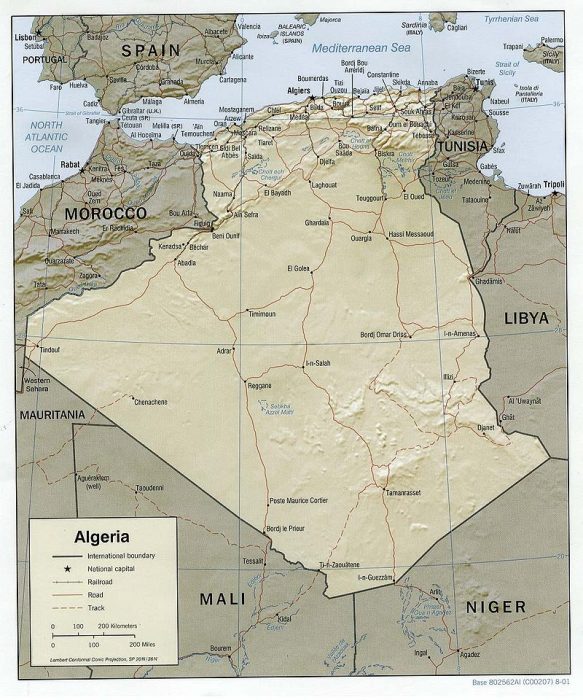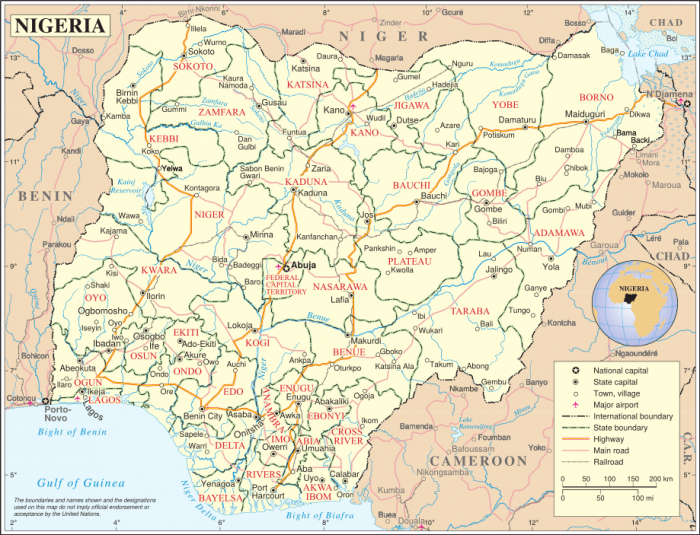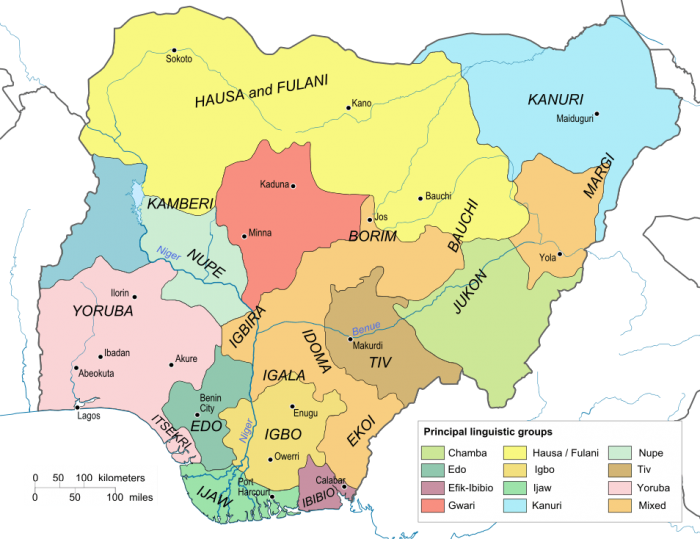
What is the largest country in Africa? The answer to that depends on how you are defining “largest” – do you mean by largest population or largest by land size/area? By population, the largest country in Africa is Nigeria, with a population of around 197 million people.
By land size, the largest country in Africa is Algeria, with an area of around 2,380,000 square kilometers. Let’s take a look at both of these countries and learn some facts about the geography and population of both countries.
Algeria
Geography
Algeria is located in North Africa and stretches from the Alboran sea in the north to the midst of the Saharan desert in the south. The country is bordered by Morocco, Western Sahara, Mauritania, Mali, Niger, Libya, and Tunisia. The Tell Atlas mountain range runs through the northern part of the country. There is also a high plateau region, made out of steppes and plains, between the Tell Atlas and the Saharan Atlas (another mountain range found in Northern Algeria just south of the Tell Atlas range).
Northeastern Algeria is made out of various plains, basins, and mountains. The coastal northeastern area of the country is mountainous, and the few plains regions that are there are where the port cities of Annaba, Skikda, and Bejaia are.
Most of the country of Algeria is covered by warm desert, the Sahara desert that runs south of the Saharan Atlas for approximately 1500 kilometers (930 miles) into the neighboring countries of Mali and Niger. One-quarter of the Algerian desert is covered by sand dunes, while the other areas are covered by large rocky plateaus, sandstone plateaus, and highlands.
The coastal regions of Algeria are referred to as the Tell, and they border the Mediterranean sea, enjoying a mild, temperate climate. Humidity is high here and rainfall abundant. The rocky areas and plateaus of Algeria can be quite cold. Though much of the country falls within the Sahara region, only a small portion of Algeria’s area is in the hot/dry regions of the Sahara.
Population/Demographics

A streetside near the University of Algiers in Algiers, Algeria’s capital. Photo: By Poudou99 – Own work (source personnelle), CC BY 3.0, https://commons.wikimedia.org/w/index.php?curid=13276217
Algeria is home to around 42,200,000 people. The vast majority of Algerian citizens, some 91% of them, live in regions bordering the Mediterranean. More than half of Algerians (around 24 million) live in urban areas, the vast majority of which are located in coastal areas. There are also around 1.5 million Algerians that live a nomadic lifestyle within the Sahara, and most of them live near oases spread throughout the desert like the Taghit oasis. The largest city in Algeria is Algiers which of the population of around 2.4 million people, followed by the city of Oran which is home to about 800,000 people, and the city of Constantine is the third-largest city in the country with a population of about 450,000.
Sunni Islam is the dominant religion of the region, with 96% of Algerians being a follower of the religion. Arabic is the dominant language of the region, but French, Berber, and English are also widely spoken.
Algeria’s life expectancy is around 76 years, while its infant mortality rate is about 21.6 deaths out of every 1000 live births.
Economy
The economy of Algeria is primarily dependent on petroleum, and the nation is thought to produce around 1.1 million barrels of crude oil every day. Algeria is also a major producer and exporter of gas, and the country has the 10th largest reserve of natural gas in the world. The nation is also ranked 16th in oil reserves. The country also has a sizable agricultural sector which accounts for about 8% of its gross national product, although the country still imports around 45% of its food. Algeria has rich deposits of minerals like copper, zinc, lead, iron, antimony, and Mercury. The most productive mines in the country produce zinc and iron.
Algerian Wildlife
Algeria hosts a few different climate types and ecosystems, and the Mediterranean wetlands, grassy deserts, and mountainous regions are all home to a wide variety of animals. Frequently spotted in Algeria are animals like gazelles, jackals, and wild boars. Cheetahs and leopards are also spotted in Algeria. Reptiles like monitor lizards and snakes can also be found in the semi-arid parts of the country. Small burrowing mammals like grass mice and sand rats are also quite common in the country.
Nigeria
Geography
Nigeria is found in western Africa, bordered by the Gulf of Guinea on the south end as well as the countries of Chad, Cameroon, Niger and the Republic of Benin. The climate of Nigeria is mainly tropical, with some regions of semi-arid and arid desert in the north. The tropical nature of the region means that the temperature ranges very little throughout the year, being predictably between 26 °C (78.8 °F) to 28 °C (82.4 °F) for the most part.
Nigeria sees abundant rainfall spread throughout two rainy seasons, with a shorter dry season and a longer dry season separating them. The Sahel climate type is the primary climate in Nigeria. Nigeria has highlands, river valleys, and coastal plains that separate it into different topographical regions. The Niger Delta is located in the southern part of the country and it is surrounded by a large belt of swamps that border the ocean. North of the Niger river valley is a series of plains, while to the west there is a section of highlands. Mountains are found throughout the middle-northern and eastern part of the country, while the northeast region of the country trends toward flat desert areas.
Population/Demographics
Nigeria is Africa’s most populous country, with a population of around 197 million people. It is also the seventh largest country by population in the world, and one of the most densely populated countries in Africa. Around half of all Nigerian citizens live in urban areas. There is a wide variety of ethnicities in Nigeria, over 250 ethnic groups overall. The biggest ethnic groups in Nigeria include Igbo, Yoruba, Hausa, and Fulani. These 250 ethnic groups speak over 500 languages total, although English is the country’s official language. There are also many French speakers in the country. Many Niger-Congo languages like Igo and Kanuri are also heavily spoken and represent one of three major linguistic families in Africa.
In terms of religion, Nigeria’s main religions are Islam and Christianity. Around half of the Nigerian population follows Islam, while some 40% of the population identifies as Christian. Various indigenous beliefs make up the remaining ten percent. Less than one percent of the population identifies as Atheist or None, with a heavy stigma against being non-religious in many parts of the country. The average life expectancy in Nigeria is around 52.62 years on average, while the infant mortality rate is around 8 out of every 1000 live births.
Economy
Nigeria’s economy is quickly growing, and it is currently ranked 21st in the world in terms of gross domestic product. Industries like agriculture, oil, telecommunications and mining are large contributors to Nigeria’s economy.
Slightly under a third of all Nigerians are employed in agriculture, and the country produces a wide variety of crops for export to other nations. Crops like cashew nuts, sesame, cocoa beans, yams, soybeans, corn, palm oil and rice are all critical crops for Nigeria’s economy. The country’s biggest crop is currently cassava, though yam production has seen a massive increase over the past couple decades, increasing from around 26 million tonnes to over 44 million tonnes between 2000 to 2016. Despite the many agricultural operations in the country, the country imports food to sustain itself.
Nigeria’s economy is also heavily supported by petroleum. Nigeria is thought to be the 12th largest petroleum producing country and the eight largest exporter of petroleum in the world. The exporting of petroleum is thought to bring in almost 40% of the country’s GDP. Nigeria has around 160 different oil fields and almost 1500 oil wells, with one of the largest and most productive fields being the Niger Delta Nembe Creek Oil Field, found in the Niger Delta Basin which is the country’s most productive oil region.
Nigeria has also heavily invested in a growing telecommunications system/market. The country is home to emerging telecom companies like 9mobile and MTN, and it is also in the middle of expanding its range of communication technology to cover space-based communication. The country has a space satellite monitored by the Nigerian space agency, which is headquartered in Abuja. Plans to expand the country’s space communications efforts are currently being discussed.
Nigerian Wildlife
Nigeria is home to a diverse ecosystem with many different species of wildlife, as the country’s mild climate creates a hospitable climate for life. Nigerian wildlife includes animals like aardvarks, cape hyraxes, the African bush elephant, hippos, bushbabies, Nigerian mole-rats, capybaras, old world fruit bats, and pangolins. Birds in Nigeria include larks, African warblers, starlings, weavers, ostriches, pelicans, frigatebirds, owls, and banded snake eagles.












